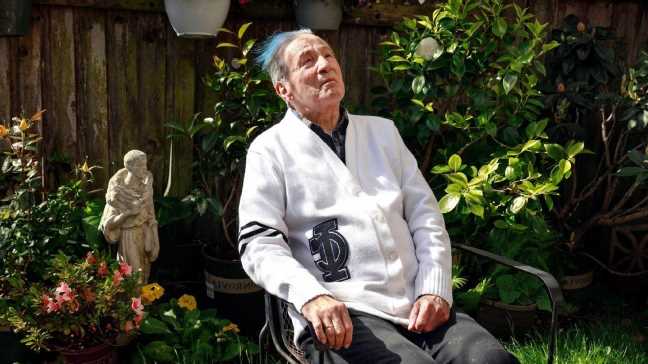- Sam Borden is a senior writer for ESPN.com.
TOM AMMIANO HAS a box in his hands. He’s a lively 79-year-old, standing outside his house on a bright May morning in the Bernal Heights neighborhood of San Francisco. He laughs as he asks if there’s a birthday cake inside the box. Then he quiets and considers the moment.
The box is a gift. But it stirs memories, too. About 60 years of pain. Some hurt and anger and shame. A lifetime of being bullied for being gay.
“You don’t forget the experience of the exclusion and the humiliation,” Tom says. “Whether I had a label for it or not, I didn’t know — but you hear all the name-calling and you knew that was you.”
Tom cradles the box. He knows there is the kindness of strangers inside, too. And even before he opens it, he knows it carries a simple reminder that no matter how long it has been, it is never too late for things to change.
IT IS 1958. Tom is in high school at Immaculate Conception, a Catholic school in Montclair, New Jersey, and he feels out of place. He has always felt different from the other boys. At 8, he dreamt of moving away to California or Texas and living with a cowboy. “Cowboys were big in those days,” he says. At 10, he put on a dress and high heels and walked out of the house.
“The family watched me as I paraded up Orange Road to Bloomfield Avenue, having a wonderful conversation with the big hat and pearls and mother’s shoes,” he says. “The family going, ‘You go get him — no, you go get him.'”
He cackles. “I think that set a benchmark.”
In this time and place more than 60 years ago, there is never any discussion about Tom being gay. Those who are trying to be kind describe Tom as “weird.” The rest — including an uncle who relentlessly refers to Tom as “Tomasina” in a singsongy way — spit a much uglier hate.
At a basketball game once, a group of boys surround Tom and chase him toward the bus stop. He is harassed every day in the school halls. Tom is skinny and slight, and the other boys, especially the athletes, gang up on him, playing whack-a-mole whenever he tries to walk past them by banging him into the lockers.
“The thing that always captured my thoughts,” Tom says, “was, ‘Jesus Christ, I’m 106 pounds — why is it always four or five people? What the hell is that about?'”
Faculty and administrators don’t help; in fact, the bullying is “nurtured,” Tom says, by the school’s football coach, who has his own style of intimidation.
Any time Tom sees the coach moving in his direction, he cringes because he knows what is coming: “Well, how ya doin‘, Ammiano?” the coach booms, followed by a smack to the kidneys and the worst kind of laughter from everyone nearby.
“Rabbit punches,” Tom says, his voice low. “Not very pretty, more common than people would like to remember.”
He shakes his head. “It was the teacher — that made it more significant and scary.”
As a young man, Tom vacillates between wanting to be true to himself and wanting, more than anything, to just fit in. At a Catholic youth event once, he starts dancing only to be told to stop because “you look like a girl.” Despite the cruelty inflicted by the athletes at IC, Tom decides to try out for the football team one year. To this day he remembers “everybody laughing” and “the coach being very, very upset and wondering why I was even there.” He quits after a single day.
During his junior year, Tom learns that IC is going to field a boys’ track team. He is intrigued. He is decently fast — “from running away from all the bullies” — and the coach of the team is a quieter, kinder teacher. Tom learns that some of the other runners know what it’s like to be ridiculed, too. One of his teammates is albino, and everyone in the school calls him “Whitey.” Another, of Middle Eastern descent, is called “Ali Baba” wherever he goes. The boys take comfort in each other’s strength in the face of misery.
At IC, there is a points system to identify which athletes will earn their varsity letters at the end of a given year. Tom thinks there is no way he’ll ever come close — such honors are only for the real jocks — but near the finish of the season, during a wet, rainy meet against Rutherford, Tom runs the mile as he never has before. “It just clicked,” he says. “Isn’t there, in horse racing, like, the mudder? I guess I was the mudder.” He crosses the finish line blissfully alone in first place.
His coach tells him excitedly that the win is worth enough points to earn a letter. Tom is stunned. “Are you sure?” he asks, nervous but full of pride. Tom Ammiano is a letterman, he thinks. If nothing else, he will be able to walk among the football players and the basketball players and the rabbit-punch coach with the same letter on his sweater that they have.
The letterman sweater costs $40, which is a lot for a working-class family like the Ammianos, but Tom and his parents scrape together the money by swallowing their pride and asking some relatives for a little extra cash. “We ate a little s— and asked for contributions,” Tom says. Tom proudly tells everyone what it is for. “I rode the high,” he says. “I thought, ‘Well, they can’t take this away from me.”
Only they could. Not long before the ceremony, Tom is told he actually won’t be getting his letter. It was a “mistake,” he is told. The school’s athletic committee — a group led by the rabbit-punch coach — has decided the meet Tom won wasn’t “legitimate.” The results aren’t valid. The points he earned there don’t count.
Tom is crushed. He doesn’t understand. Except, he does understand.
“I was f–gy,” he says. At a Catholic school in the 1950s, the idea of someone like him getting a letter — the ultimate in masculinity — makes the other athletes feel somehow “less than.” Denying him allows them to confirm their imagined superiority.
“It was definitely a feeling of despair,” Tom says, adding that he remembers thinking, over and over: “Why did I even try? Why didn’t I know better?”
He holds his misery inside.
He returns the money he borrowed. Turns out, I don’t need it, he tells his relatives, trying to smile through his embarrassment. When they ask what happened, he plays it off like no big deal. Why won’t he get his letter? “Oh, I don’t even know,” he says.
TOM ESCAPES THE Northeast in 1963, when he is 21. He saves up another $40 and takes a Greyhound bus across the country. He arrives in San Francisco after three days assuming he’ll never hear anything about IC or track or varsity letters or rabbit punches ever again.
The experience with the letter is a fire, though, a motivator. The sense of injustice he felt at IC drives him. He works as a teacher but quickly becomes an activist, fighting alongside Harvey Milk — “We were buds; we were what we called sisters” — in the earliest stages of the gay rights movement.
In 1975, Tom comes out as one of the first openly gay schoolteachers in San Francisco. In 1978, he teams with Milk and many others to defeat the Briggs Initiative, a bill banning any gay person from teaching in California. After Milk’s assassination later that year, Tom pushes on through his grief, becoming more and more focused on demanding progress.
“The injustice part” of losing the letter, he says, “I think I’ve carried that with me for a long time, and I think it’s reflected in my political career. So much immense shame and so much anger … it made me really resolved not to continue to take it.”
He dabbles in stand-up comedy but moves into politics, sprinkling some of his one-liners into bill discussions or tense meetings. He gets elected to the city’s board of education and board of supervisors. He runs for mayor twice. He spends six years in the California State Assembly, agitating for reform on critical issues such as universal health care access, educational equity, domestic partner recognition and the living wage.
Tom steps down from the State Assembly in 2014, and in December 2020, he goes on KQED, a public radio station in San Francisco, to promote his recently released memoir, “Kiss My Gay Ass.” (The title is a callback to a famous rebuke Tom shouted at then-Gov. Arnold Schwarzenegger over a decade earlier.)
Tom is mostly on the show to talk about his book and his life in politics, but one of the hosts asks Tom about his high school experience and Tom tells a short version of what happened with his varsity letter.
The interview moves on to other subjects. But in his house in Hayward, just outside the city, a man named Stephen Saxon happens to have put in his headphones just as Tom is beginning his story. A professional musician and Jewish cantor who also works in cybersecurity, Saxon hears Tom describe the pain he felt about having his letter taken away from him. He hears Tom say, “Those things still hurt … even a hundred years later.”
Those words — those things still hurt — take root in his brain. He thinks about the pain we all carry from our youngest days to our oldest. He thinks about the Jewish concept of tikkun olam, an ethos that literally means, “repair the world” and charges every person with the obligation to mend the rips and tears and holes around us. He thinks about time.
Saxon learns that Tom went to high school at Immaculate Conception. He looks up the school. He finds the name and email address of one of IC’s current administrators and sends a letter.
“I have no direct connection with him, with you or even with his primary political constituency,” Saxon writes, “but I was wondering if you might consider reaching out to Tom, and awarding him his varsity letter in the interest of healing old wounds and paying respect to one of your alumni who has lived a good and positive life.”
He has no particular hope that anything will come of it, no particular belief that his email will do anything more than disappear down an internet black hole. But still — he feels something so he does something. He signs the letter, “Sincerely, Stephen Saxon.”
IN EARLY FEBRUARY, Tom gets a letter from Immaculate Conception High School. He thinks it is a fundraising request, a form letter, and nearly throws it out. Then he opens it.
“Dear Tom,” it begins, “We recently received an email from a listener who happened to hear a radio interview of yours …”
Tom’s eyes go wide. The letter is from Patrick Dyer, the school’s vice president, and Nora Bishop, its director of alumni relations, and it explains that the current administrators at IC are “dismayed” by the situation that took place so many years ago and would “like to ‘right’ this ‘wrong.'”
Tom feels “initially a little bit at sea” as he reads. Just seeing the IC letterhead makes six decades ago feel like yesterday.
The letter says that after hearing about what happened to Tom, IC reached out to one of Tom’s teammates, Paul Deignan, who said that Tom “certainly” deserved to be a letterman and was important to the team. They also spoke with Tom’s track coach, Ed Kirk, who confirmed that Tom had earned the letter with his performance.
In an interview, Kirk, who is 90, says he never knew Tom hadn’t received a letter. Kirk says he distinctly recalls that the athletic director — perhaps not coincidentally, he now realizes — asked him to step out into the hallway to discuss something during the part of the ceremony when the kids’ names were announced. “Tommy deserved it then, and he deserves it now,” Kirk says.
IC explains to Tom that it is going to have a custom-made letter and sweater packaged for him and that the school is going to award it even though it is “well past-due.” The letter says that IC knows about all the important work Tom has done in his career and is proud to call him an alumnus. “You are an inspiration,” the administrators write.
“It’s nothing I ever would have tried or nothing I would have ever asked anybody to do,” Tom says. “I was done. They pursued it. They talked to the coach, they talked to other people. And they decided this shouldn’t stand.”
As he reads, Tom doesn’t know about Stephen Saxon or what he did. He doesn’t know about the awkward dance these IC administrators went through as they juggled the traditional Catholic views of the school’s archdiocese with their personal views that Tom had been denied something he deserved.
In that moment, all Tom knows is what he feels — and it is a little bit of everything all at once. There is that familiar sting, the uncomfortable feeling he thought he had left behind in New Jersey long ago, the dread that crops up as soon as he thinks about IC and being a teenager. But there is, also, a warmth. A glimmering. A happiness about a place he wasn’t sure could ever make him happy but maybe, so many years later, actually can.
“Getting older, you think some doors are closed, and that’s not the case,” Tom says. “I’ve never been old before. So I didn’t know.”
He laughs. “This doesn’t change the world,” he says. “But it changes something.”
STEPHEN SAXON WAITS outside Tom’s front door. On that May morning, standing in the sunlight, it is hard not to think about the strange sequence of events that brought him — and the cardboard box in his hands — to this place.
How many people heard that interview? Hundreds? Thousands? And Stephen was the only one who did something? The only one who felt compelled to do more than click to the next station and listen some more? Stephen hears Tom coming to the door. Was it something in his own past? Or was it the knowledge that sometimes the littlest things we do make the biggest difference?
“I think,” Stephen says simply, “I would want someone to do it for me.”
The door opens. The two men greet each other. Tom makes the joke about a birthday cake. They agree to meet again someday, over martinis next time.
“This is your sweater … and your letter,” Saxon says. The school couldn’t send someone to California to deliver the package, but he was happy to fill in. He hands the box over, steps back and waves, then drives away.
Inside his house, Tom carefully opens the box. He slips on the soft, white sweater, murmuring a few bars from the school song. He poses for his husband, Carolis Deal, who snaps a picture. He runs his hands over the dark “IC” on the front.
“Well, I’ll be damned,” he says. “Only 63 years …”
Tom does up the buttons. He fluffs the collar. He flexes the sleeves and looks in the mirror.
Tom Ammiano is a letterman.
Source: Read Full Article






